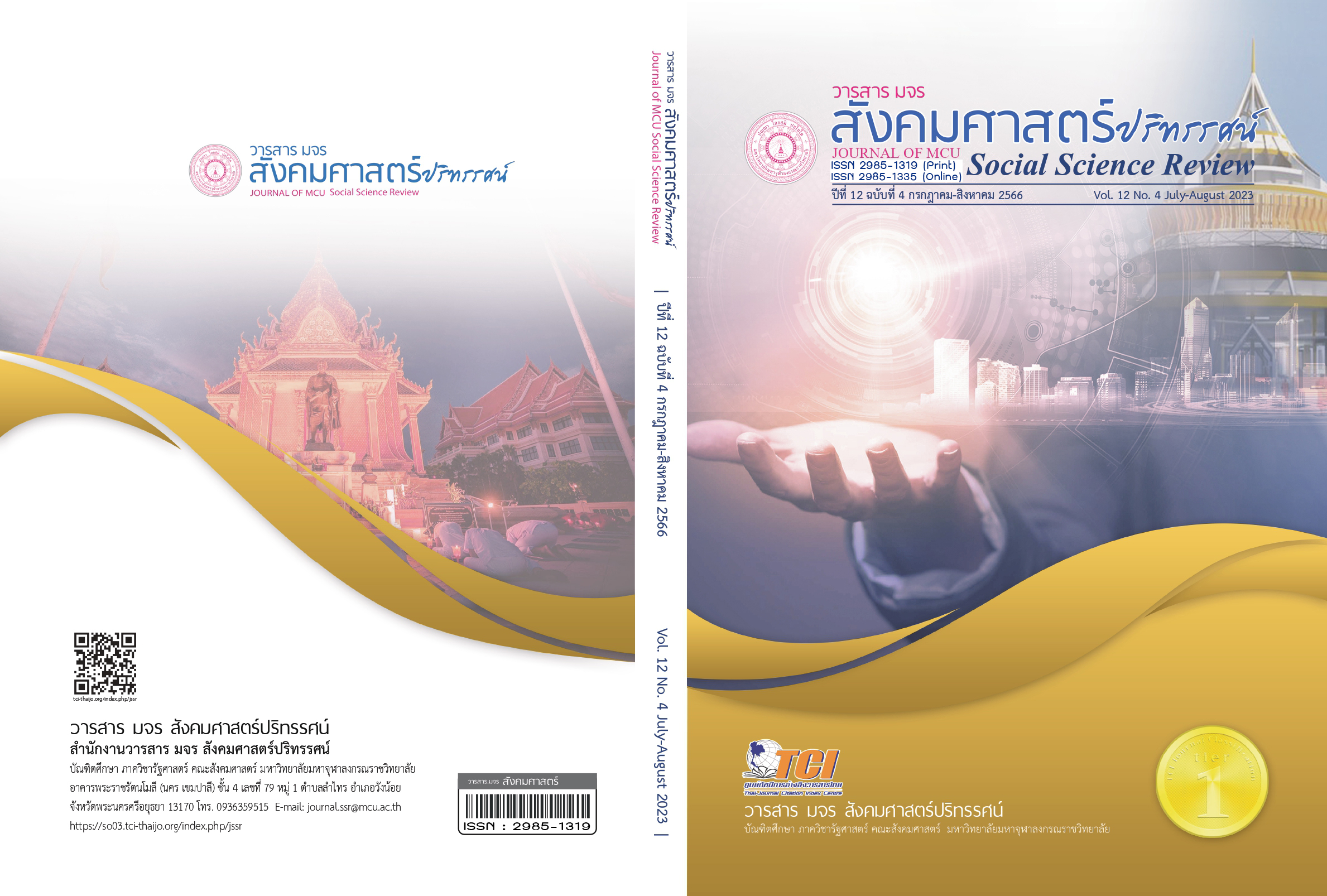บทบาทของมหาวิทยาลัยในการส่งเสริมการเรียนรู้ตลอดชีวิต
คำสำคัญ:
การเรียนรู้ตลอดชีวิต, มหาวิทยาลัย, บทบาทบทคัดย่อ
การเรียนรู้ตลอดชีวิตเป็นสิ่งที่มีความจำเป็นสำหรับบุคคลทุกช่วงชีวิต ในสภาวะที่สังคมมีความเปลี่ยนแปลงอย่างรวดเร็ว ผันผวนและมีความซับซ้อนทั้งด้านเศรฐกิจ สังคม การเมือง สภาพแวดล้อมและเทคโนโลยี การเรียนรู้ตลอดชีวิตยิ่งมีความจำเป็นต่อการพัฒนาคุณภาพชีวิตของบุคคลมากขึ้น แต่การจะส่งเสริมให้ประชากรทั้งประเทศได้เรียนรู้ตลอดชีวิตนั้น ไม่สามารถดำเนินการได้โดยหน่วยงานใดหน่วยงานหนึ่งเท่านั้น จำเป็นต้องอาศัยความร่วมมือของทุกภาคส่วน ทั้งหน่วยงานภาครัฐ เอกชน องค์กรท้องถิ่น สถาบันการศึกษา สถาบันศาสนาและประชาชน มหาวิทยาลัยเป็นสถาบันการศึกษาระดับอุดมศึกษาที่นับว่าเป็นแหล่งทรัพยากรที่มีคุณค่าอย่างยิ่งของสังคมและประเทศชาติ เพราะมหาวิทยาลัยมีความพร้อมในด้านวิชาการและแหล่งเรียนรู้ต่าง ๆ ดังนั้นหากมหาวิทยาลัยได้มาช่วยส่งเสริมการเรียนรู้ตลอดชีวิตอย่างเต็มศักยภาพจะทำให้ประชาชนในทุกพื้นที่ของประเทศมีโอกาสเข้าถึงการเรียนรู้ตลอดชีวิตได้อย่างทั่วถึงมากขึ้น
เอกสารอ้างอิง
กรมกิจการผู้สูงอายุ. (2564). สถิติประชากรผู้สูงอายุ. กรุงเทพฯ: กรมกิจการผู้สูงอายุ.
กลุ่มยุทธศาสตร์กำลังคนในระบบการอุดมศึกษา วิทยาศาสตร์วิจัยและนวัตกรรม. (2563). รายงานการศึกษาเรื่องการส่งเสริมการเรียนรู้ตลอดชีวิต (Lifelong learning) เพื่อรองรับการพลิกโฉมฉับพลันและวิกฤตการณ์โลก. กรุงเทพฯ: สำนักงานสภานโยบายการอุดมศึกษาวิทยาศาสตร์วิจัยและนวัตกรรมแห่งชาติ.
พระเทพเวที (ป.อ.ปยุตโต). (2532). หลักการศึกษาในพระพุทธศาสนา (พิมพ์ครั้งที่ 3). กรุงเทพฯ: จุฬาลงกรณ์มหาวิทยาลัย.
สำนักนโยบายและแผนการอุดมศึกษา สำนักงานปลัดกระทรวงการอุดมศึกษาวิทยาศาสตร์วิจัยและนวัตกรรม. (2564). แผนด้านการอุดมศึกษาเพื่อผลิตและพัฒนากำลังคนของประเทศ พ.ศ. 2564-2570. กรุงเทพฯ: บริษัทภาพพิมพ์จำกัด.
สำนักงานคณะกรรมการการศึกษาแห่งชาติ. (2545). พระราชบัญญัติการศึกษาแห่งชาติ พ.ศ.2542 และที่แก้ไขเพิ่มเติม (ฉบับที่ 2) พ.ศ.2545. กรุงเทพฯ: บริษัทพริกหวานกราฟฟิกจำกัด.
สุมาลี สังข์ศรี. (2544). การศึกษาตลอดชีวิตเพื่อสังคมไทยในศตวรรษที่ 21. กรุงเทพฯ: สำนักงานคณะกรรมการการศึกษาแห่งชาติ.
สุนทร สุนันท์ชัย. (2551). หน่วยที่ 1 ความรู้พื้นฐานการศึกษาตลอดชีวิต ในสาขาวิชาศึกษาศาสตร์ มหาวิทยาลัยสุโขทัยธรรมาธิราช (พิมพ์ครั้งที่4). นนทบุรี: โรงพิมพ์มหาวิทยาลัยสุโขทัยธรรมาธิราช.
Cropley, A.J., & Dave, R.H. (1978). Lifelong education and the training of teachers: Developing a curriculum for teacher education because of the principles of lifelong education. Germany: UNESCO Institute for Education.
European Commission. (2000). A memorandum on lifelong learning. Luxembourg: European Commission.
Field, J. (2001). Lifelong education. International Journal of Lifelong Education, 20(1), 3-15.
Hargreaves, D.H. (2004). Learning for life- The foundations for lifelong learning. Bristol: Policy Press.
Jarvis, P. (2006). Towards a comprehensive theory of human learning. London: Routledge.
Lengrand, P. (1970). An introduction to lifelong education. Paris: UNESCO.
OECD. (2021). The Survey of Adult Skills: Program for the International Assessment of Adult Competencies (PIAAC). Retrieved March 20, 2020, https://www.oecd.org/skills/piaac/about/#d.en.481111
Ouane, A. (2009). UNESCO’s drive for lifelong learning. In Jarvis, P. (Ed.). (2009). The Routledge international handbook of lifelong learning. London New York: Routledge.
Power, C. N., & Maclean, R. (2013). Lifelong learning: Meaning, challenges, and opportunities. In Maclean, R., Jagannathan, S., & Sarvi, J. (Eds.). (2013). Skills development for inclusive and sustainable growth in developing Asia-pacific. Dordrecht: Springer.
Skager, R., & Dave, R.H. (1977). Curriculum evaluation for lifelong education. Oxford: Pergarmon Press.
World Economic Forum. (2020). These are the top 10 job skills of tomorrow – and how long it takes to learn them: Top 10 skills of 2025. Retrieved March 20, 2020, https://www.weforum.org/agenda/2020/10/top-10-work-skills-of-tomorrow-how-long- it-takes-to-learn-them/
Yang, J., et al. (eds.). (2015). The role of higher education in promoting lifelong learning. Hamburg Germany: UNESCO Institute for Lifelong Learning.
ดาวน์โหลด
เผยแพร่แล้ว
รูปแบบการอ้างอิง
ฉบับ
ประเภทบทความ
สัญญาอนุญาต
ลิขสิทธิ์ (c) 2023 วารสาร มจร สังคมศาสตร์ปริทรรศน์

อนุญาตภายใต้เงื่อนไข Creative Commons Attribution-NonCommercial-NoDerivatives 4.0 International License.
เพื่อให้เป็นไปตามกฎหมายลิขสิทธิ์ ผู้นิพนธ์ทุกท่านต้องลงลายมือชื่อในแบบฟอร์มใบมอบลิขสิทธิ์บทความให้แก่วารสารฯ พร้อมกับบทความต้นฉบับที่ได้แก้ไขครั้งสุดท้าย นอกจากนี้ ผู้นิพนธ์ทุกท่านต้องยืนยันว่าบทความต้นฉบับที่ส่งมาตีพิมพ์นั้น ได้ส่งมาตีพิมพ์เฉพาะในวารสาร มจร สังคมศาสตร์ปริทรรศน์ เพียงแห่งเดียวเท่านั้น หากมีการใช้ภาพหรือตารางหรือเนื้อหาอื่นๆ ของผู้นิพนธ์อื่นที่ปรากฏในสิ่งตีพิมพ์อื่นมาแล้ว ผู้นิพนธ์ต้องขออนุญาตเจ้าของลิขสิทธิ์ก่อน พร้อมทั้งแสดงหนังสือที่ได้รับการยินยอมต่อบรรณาธิการ ก่อนที่บทความจะได้รับการตีพิมพ์ หากไม่เป็นไปตามข้อกำหนดเบื้องต้น ทางวารสารจะถอดบทความของท่านออกโดยไม่มีข้อยกเว้นใดๆ ทั้งสิ้น





